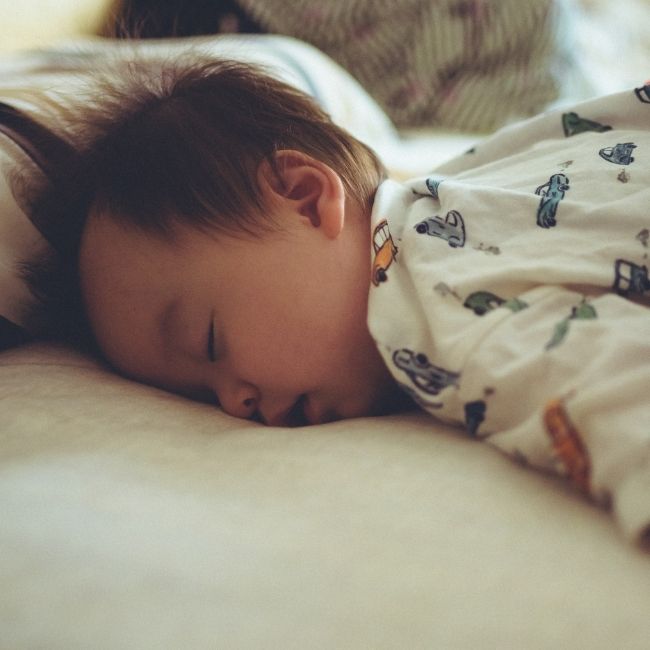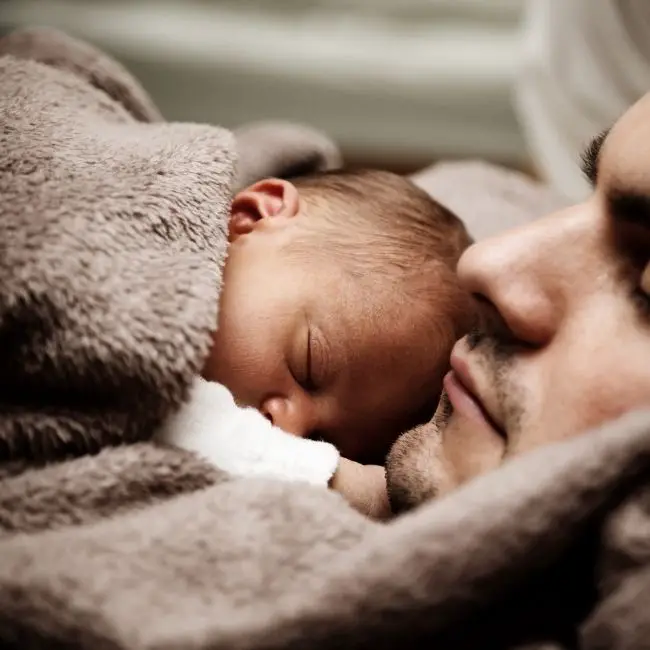Have you noticed that your baby keeps sleeping face down? If so, it may be time to act. Allowing a baby to sleep face down can be dangerous for several reasons, but sometimes, it is perfectly okay. So, when is it okay for a baby to sleep face down? We will answer that question and more in this post.
Is it OK if my baby sleeps face down?
Not really, but it also depends on your baby’s age.
Generally speaking, you won’t want your baby sleeping, literally, face down because this presents a suffocation risk for all ages.
If, however, your child is an infant, you will always want to lie your baby down face up. This is until at least 12 months of age. Never voluntarily place your baby face down to go to sleep prior to this age.

What age can babies sleep face down?
Beyond the 12 month rule, the typical age for babies to be okay sleeping stomach down begins at about 6 months.
That’s because, at 6 months, your baby is probably able to flip him or herself over on their own. Once they’ve mastered that milestone, it is perfectly okay to allow your baby to sleep in whatever position they choose. Back or stomach, as long as it isn’t compromising their safety.
On the flip side, if your baby is younger than 6 months or has not yet mastered the skill of flipping him or herself over, then it is a bad idea to lay, or keep, your baby on his or her stomach during sleep.
Ideally, you should keep your baby on his or her back until they can flip over on their own.
This isn’t to say that your baby won’t flip on his or her back sometimes even before then. Sometimes babies figure out how to do remarkable things, even before they are ready!
However, if your young baby has flipped themselves onto their stomach during sleep before their time, you’ll need to carefully flip them back over onto their backs.
Can I let my baby sleep on his stomach if I watch him?
Even if you are watching your baby, you won’t want to allow him or her to sleep on their stomachs.
Babies can aspirate while sleeping. Sometimes this causes them to choke or gag, especially if you move or pick them up from this position quickly. Watching your baby won’t prevent this from happening.
Another thing to consider is that, although you may be watching your child, it could be that your baby’s positioning, unbeknownst to you, is causing him or her to breathe in carbon dioxide.
As your baby breathes out, the carbon dioxide emitted from his or her mouth re-enters their body, making oxygen levels low and carbon dioxide levels high. This can cause the baby to lose consciousness.
Moreover, babies that sleep on their stomachs are at higher risk for developing ear infections, fevers and stuffy noses.
Remember that none of the aforementioned results of stomach sleeping just mentioned can be averted by watching your baby.
You can, however, avoid having your baby sleep with something near his or her face or mouth. This is another major reason for suffocation or complications during baby sleep. But this isn’t the only concern when it comes to stomach sleeping.
Newborn only sleeps on belly
Though older generations have a habit of recommending it, the truth is that no newborn should be sleeping on his or her belly.
The act of stomach sleeping for a baby, and especially a newborn, can be very dangerous. Newborns are unable to wiggle themselves out of compromising positions and are unable to communicate when something is wrong.
Babies this young will have literally only seconds to live if their sources of oxygen are compromised in any way. Meaning it is imperative that you stay diligent about keeping your baby off of his or her stomach during sleep.
And this isn’t just made up. Nearly 2,300 babies die from SIDS (or Sudden Infant Death Syndrome) each year. Oftentimes, this is due to compromising sleep positions.
Even if you, or someone you know, has allowed their young baby to sleep on their stomach in the past, it isn’t a good idea. And just because your baby seems to sleep better this way doesn’t mean it is wise to leave them like that.
Remember, it only takes a few seconds for your baby to become deprived of the oxygen she or he needs to survive. We recommend simply placing your child on his or her back until they are at least able to flip themselves over before allowing your child to sleep on their stomach.

Should I let my 5 month old sleep on his stomach?
If your 5 month old is flipping him or herself over on their own and has flipped themselves onto their stomach at night, then it is okay to keep them there.
It is worth noting that it is only okay to leave a baby this age on their tummy if they have placed themselves there. But it is never okay for you to place them like that.
Rather, you should place your baby on his or her back initially every time you lower them into their crib. If your baby flips over while in there, you may leave them like that. That is, assuming there is nothing covering their face or compromising their safety in any way.
6 month old sleeping on stomach face down
If it be the case that you have a child who is, quite literally, sleeping with their face buried into the mattress, you will need to act. No child at any age should be permitted to sleep with their face completely down. This especially for newborns and young babies.
You’ll need to gently turn the baby’s head if they are old enough to allow them to remain on their stomachs. Or flip them completely over if they aren’t yet at the suitable age to allow the baby to remain on their back.
As mentioned in the above section, allowing your baby to sleep on their stomach is fine as long as it is your baby that has placed themselves there and not you. A baby that is 6 months old could very well be flipping themselves both frontward and backward. Thus, it is deemed safe to leave them in that position as they are sleeping.
Bear in mind that a child under 6 months of age, or that is unable to flip themselves over, but has still found themselves on their stomach, will need to be turned back to their backs. There are times when even very young babies may manage to flip themselves onto their stomachs every once in a while. But they should not be permitted to remain this way.
Always flip a baby younger than 5-6 months, or who cannot flip themselves over, onto their back if you notice them stomach sleeping.
Should I let my 7 month old sleep on his stomach?
You can allow your 7 month old to sleep on his or her stomach. As long as he or she is able to flip both forward and backward. In addition, you must be careful not to put your baby on his or her stomach to sleep on purpose.
This means that you will initially want to lay your baby on his or her back during every sleep time until your baby is at least 12 months of age. If your child rolls over after placing them down, it is perfectly fine to leave them there, assuming they are consistently able to flip themselves both forward and back.
Can babies sleep face down on chest?
Is it okay for babies to stomach sleep when laying on their parent?
Assuming that you are also laying down while this happens, the same rules apply as if you weren’t holding your baby when it comes to baby sleeping on stomach.
If, however, you are sitting up while holding your baby and your baby is sleeping upright, then it is fine for your baby to be on his or her stomach.
Having said that, there are still concerns associated with holding your baby while he or she is sleeping.
Although you and your baby may be upright, it is important that you, the parent or caregiver, are not excessively tired or lethargic when holding your child. If you were to fall asleep, you could end up dropping your baby or your baby could fall over without your knowledge.
If either of these happens, you could put your baby at extreme risk for injury or death. Thus, when holding your baby upright on his or her stomach, it is imperative that you are awake and alert.

What if baby rolls to stomach while sleeping?
Assuming that your baby is old enough to flip him or herself over (about 6 months), it is fine if your baby has flipped themselves over.
It isn’t fine, however, to leave your baby on his or her stomach if your baby is younger than 6 months or has effectively achieved a stomach position by accident. In this case, you’ll want to carefully flip your baby back over.
Yes, this will likely disrupt your child’s sleep, but for the reasons previously mentioned, it is a necessary action to take.
Bear in mind that once your child is old enough to flip his or herself over on their own, it is perfectly normal for you to feel anxious if you notice them on their stomach for the first time. If this describes you, feel free to flip your baby back over onto his or her back, but remember that the more times you flip your child, the less rested he or she will likely be.
Why is it bad for baby to sleep face down?
Sleeping face down has been linked to SIDS, one of the leading causes of infant deaths.
Because babies are unable to adjust themselves properly in the face of danger or peril, allowing your baby to sleep on his or her stomach puts them at risk for suffocation, especially if they are sleeping with loose blankets and toys.
Another concern with allowing an infant to sleep on his or her stomach is the risk of aspiration and the inhalation of carbon dioxide.
Laying flat can cause mucus and saliva to pool in your baby’s mouth. So it is likely that, especially if you or someone else picks up your baby suddenly, he or she could choke.
Moreover, carbon dioxide inhalation happens when your baby re-breathes the carbon dioxide that was put out of their mouth. This can cause your baby to lose consciousness.
You can avoid both of the previously mentioned negative outcomes. Do so by simply placing your baby on his or her back during sleep times.
Can baby suffocate sleeping on tummy?
As you likely already know, placing loose blankets, toys and other objects in your baby’s bed is incredibly dangerous.
Whether your baby is on their back or their tummy, it is true that placing loose objects in your baby’s bed can lead to suffocation. To be safe, always place your child under the age of 12 months on his or her back to sleep in a crib that is free from blankets, toys, stuffed animals and the like.
If you’d like, you may purchase a sleep sack that functions as a blanket but clings to the child’s body to keep your child warm, safe and on his or her back for the entirety of his or her sleep.
How to stop baby sleeping face down
Can I use a wedge to prevent baby from rolling over?
There are several wedges and positioners that prevent babies from flipping over, but that doesn’t mean they should be used.
Studies show that using positioning wedges and similar gadgets actually pose a similar risk that blankets, pillows and other cushions do. There have been several infant deaths that have occurred due to these positioners alone.
Moreover, many parents recommend putting rolled up blankets or towels down by your baby’s hips to prevent them from rolling over. In this way the blankets or towels act as a barrier or wedge to keep your baby from flipping.
And although this is a worthy cause, the truth remains that using a wedge, positionioner, blanket or towel of any type is incredibly dangerous and could end up taking the life of your child.
Instead, we recommend simply following the aforementioned guidelines for keeping your baby on his or her back.
Here are a few additional tips for keeping baby from sleeping face down:
- Place Your Baby on His or Her Back to Begin With: Remember that even if your child is at the age where he or she can flip themselves over, you should never place your child directly on his or her stomach to sleep if they are under 12 months. You can, however, allow your little one to stay on their stomach to sleep if they position themselves that way assuming that your baby is at least 6 months or older. If they cry and fight the position, try swaddling your baby first before putting them to bed.
- Allow Your Baby to Get Comfy: After 6 months of age, or once your baby can confidently flip themselves over, it is okay to leave your baby on his or her stomach if they end up that way. You can be confident that your baby can reposition themselves if they need to once they hit this point in their development.
- Ensure a Safe Environment: Remember, it doesn’t matter if your baby is on his or her back or stomach if there are loose blankets or objects in the crib. Loose blankets, toys and other objects may be tempting to place in your baby’s crib, but they are also deadly. Keep your baby’s crib free of objects and blankets until your baby is at least 12 months of age.
- Don’t Use Positioners: As tempting as they may be to use, positioners and wedges have caused many deaths caused despite claiming to keep your child safe in their sleep. As previously mentioned, items that you may add to your baby’s crib are extremely dangerous. Positioners and wedges are no different. If your baby flips over before he or she is actually ready, simply flip them back over on their back.
- Count the Costs: Though many parents know the risks and have heard the warnings that surround placing babies on their stomachs, many choose to do it anyway often at the coaxing of well-meaning friends and family members. It is important to remember that although many children are just fine sleeping on their tummies at a young age, many babies also lose their lives having done so. Don’t take the risk. Always place your baby on his or her back until he or she is at least 12 months of age.
Baby Keeps Sleeping Face Down: Could Be a Major Issue
To summarize, it is always best to place your baby under 12 months of age on his or her back when placing them in the crib for sleep. Doing so significantly reduces the risk of death for young infants and can give you peace of mind knowing that your child is sleeping soundly.
Remember also to keep your baby’s crib free of loose blankets, pillows, positioners and wedges, and talk to your pediatrician about any specific concerns you may have about your baby’s sleep.
Lynn
Lynn is a freelance writer, a wife, and a mother of two beautiful kids. Lynn started Infant Empire with the aim of making parenting easier for fellow mums and dads. She believes the parenting tips provided here will be of great help to all parents.Recommended Reading
When should you transition from swaddle to sleep sack or sleeping bag?
in this article, we shall look at some of the things to look out for in order to determine when to transition from swaddle to sleep sack or sleeping bag.
3 Year Old Sleep Regression: Toddler Sleep Pattern Changes
A 3-year-old's sleep regression is a real struggle. Join us as we explore the many aspects of sleep regressions for 3-year-olds.
How To Transition Baby From Bassinet To Cot
The appropriate method to use to transition baby from bassinet to cot depends on several factors like their age and ability to adapt to sleeping alone.
Baby Won’t Sleep Unless Held: Baby Sleeping Tips
Toddler Bedroom Essentials: Transitioning Your Toddler to a “Big Kid” Room
We'll help you prepare to transition your toddler from their nursery to their own “big kid” room. Check out these toddler bedroom essentials!
Toddler Keeps Getting Out of Bed in Middle of Night?
Notice that your toddler keeps getting out of bed in the middle of the night? Most parents face this. How do you handle it?